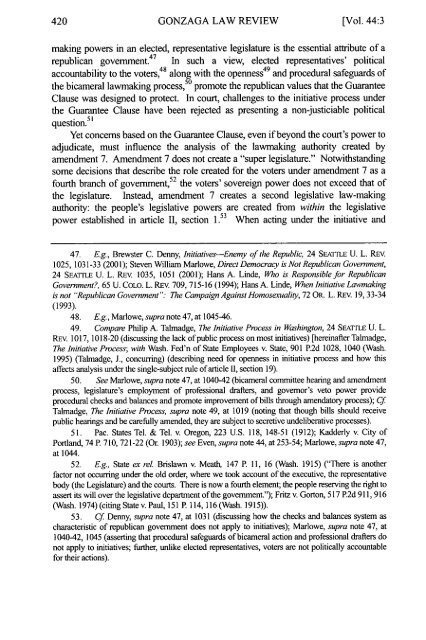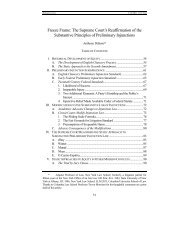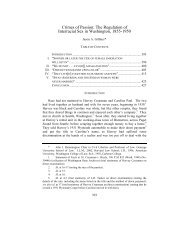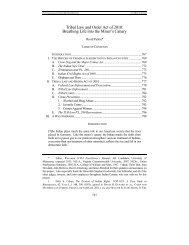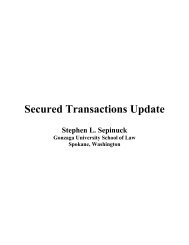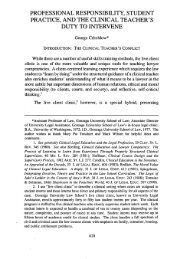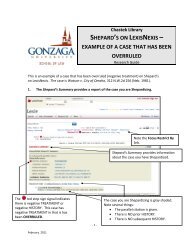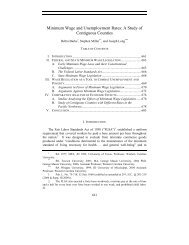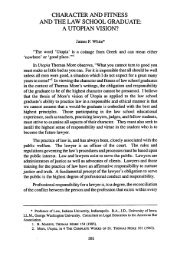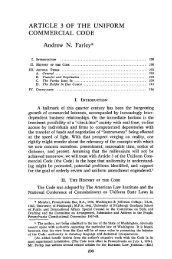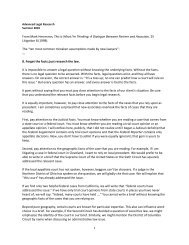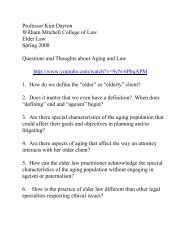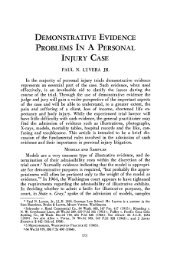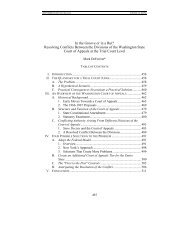I Developments in Washington's Law of Law-Making - Gonzaga ...
I Developments in Washington's Law of Law-Making - Gonzaga ...
I Developments in Washington's Law of Law-Making - Gonzaga ...
Create successful ePaper yourself
Turn your PDF publications into a flip-book with our unique Google optimized e-Paper software.
GONZAGA LAW REVIEW<br />
[Vol. 44:3<br />
mak<strong>in</strong>g powers <strong>in</strong> an elected, representative legislature is the essential attribute <strong>of</strong> a<br />
republican government. 47 In such a view, elected representatives' political<br />
accountability to the voters, 48 along with the openness 4 9 and procedural safeguards <strong>of</strong><br />
the bicameral lawmak<strong>in</strong>g process, 50 promote the republican values that the Guarantee<br />
Clause was designed to protect. In court, challenges to the <strong>in</strong>itiative process under<br />
the Guarantee Clause have been rejected as present<strong>in</strong>g a non-justiciable political<br />
question. 5 1<br />
Yet concerns based on the Guarantee Clause, even if beyond the court's power to<br />
adjudicate, must <strong>in</strong>fluence the analysis <strong>of</strong> the lawmak<strong>in</strong>g authority created by<br />
amendment 7. Amendment 7 does not create a "super legislature." Notwithstand<strong>in</strong>g<br />
some decisions that describe the role created for the voters under amendment 7 as a<br />
fourth branch <strong>of</strong> government, 52 the voters' sovereign power does not exceed that <strong>of</strong><br />
the legislature. Instead, amendment 7 creates a second legislative law-mak<strong>in</strong>g<br />
authority: the people's legislative powers are created from with<strong>in</strong> the legislative<br />
power established <strong>in</strong> article II, section 1. 53 When act<strong>in</strong>g under the <strong>in</strong>itiative and<br />
47. E.g., Brewster C. Denny, Initiatives-Enemy <strong>of</strong> the Republic, 24 SEAtTLE U. L. REv.<br />
1025, 1031-33 (2001); Steven William Marlowe, Direct Democracy is Not Republican Government,<br />
24 SEATTLE U. L. REv. 1035, 1051 (2001); Hans A. L<strong>in</strong>de, Who is Responsible for Republican<br />
Government?, 65 U. COLO. L. REv. 709, 715-16 (1994); Hans A. L<strong>in</strong>de, When Initiative <strong>Law</strong>mak<strong>in</strong>g<br />
is not "Republican Government": The Campaign Aga<strong>in</strong>st Homosexuality, 72 OR. L. REv. 19, 33-34<br />
(1993).<br />
48. Eg., Marlowe, supra note 47, at 1045-46.<br />
49. Compare Philip A. Talmadge, The Initiative Process <strong>in</strong> Wash<strong>in</strong>gton, 24 SEATTLE U. L.<br />
REv. 1017, 1018-20 (discuss<strong>in</strong>g the lack <strong>of</strong> public process on most <strong>in</strong>itiatives) [here<strong>in</strong>after Talmadge,<br />
The Initiative Process; with Wash. Fed'n <strong>of</strong> State Employees v. State, 901 P.2d 1028, 1040 (Wash.<br />
1995) (Talmadge, J., concurr<strong>in</strong>g) (describ<strong>in</strong>g need for openness <strong>in</strong> <strong>in</strong>itiative process and how this<br />
affects analysis under the s<strong>in</strong>gle-subject rule <strong>of</strong> article H, section 19).<br />
50. See Marlowe, supra note 47, at 1040-42 (bicameral committee hear<strong>in</strong>g and amendment<br />
process, legislature's employment <strong>of</strong> pr<strong>of</strong>essional drafters, and governor's veto power provide<br />
procedural checks and balances and promote improvement <strong>of</strong> bills through amendatory process); Cf<br />
Talmadge, The Initiative Process, supra note 49, at 1019 (not<strong>in</strong>g that though bills should receive<br />
public hear<strong>in</strong>gs and be carefully amended, they are subject to secretive undeliberative processes).<br />
51. Pac. States Tel. & Tel. v. Oregon, 223 U.S. 118, 148-51 (1912); Kadderly v. City <strong>of</strong><br />
Portland, 74 P. 710, 721-22 (Or. 1903); see Even, supra note 44, at 253-54; Marlowe, supra note 47,<br />
at 1044.<br />
52. E.g., State ex rel. Brislawn v. Meath, 147 P. 11, 16 (Wash. 1915) ("There is another<br />
factor not occurr<strong>in</strong>g under the old order, where we took account <strong>of</strong> the executive, the representative<br />
body (the Legislature) and the courts. There is now a fourth element; the people reserv<strong>in</strong>g the right to<br />
assert its will over the legislative department <strong>of</strong> the government."); Fritz v. Gorton, 517 P.2d 911,916<br />
(Wash. 1974)(cit<strong>in</strong>g State v. Paul, 151 P. 114, 116 (Wash. 1915)).<br />
53. Cf Denny, supra note 47, at 1031 (discuss<strong>in</strong>g how the checks and balances system as<br />
characteristic <strong>of</strong> republican government does not apply to <strong>in</strong>itiatives); Marlowe, supra note 47, at<br />
1040-42, 1045 (assert<strong>in</strong>g that procedural safeguards <strong>of</strong> bicameral action and pr<strong>of</strong>essional drafters do<br />
not apply to <strong>in</strong>itiatives; further, unlike elected representatives, voters are not politically accountable<br />
for their actions).


